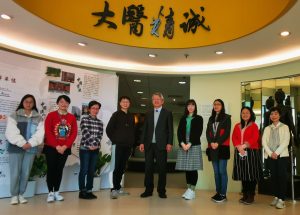Launch of the new Chinese EQUATOR Centre and an interview with the Director
26/01/2021The EQUATOR Network is delighted to announce the launch of the Chinese EQUATOR Centre. Aiming to foster initiatives to improve research reporting in the health sciences, the Chinese EQUATOR Centre will work following the principles and mission of the EQUATOR Network and enhance its impact throughout China.
The Chinese EQUATOR Centre, which is based at Hong Kong Baptist University, is directed by Professor Zhaoxiang Bian and encompasses a team of 9 other researchers all based in Hong Kong.
The UK EQUATOR Centre recently interviewed Professor Bian about his plans for the new Centre.
What inspired you to join the EQUATOR Network and lead the creation of a Chinese EQUATOR Centre? What was your motivation?
Thanks for this question. There are indeed some significant reasons that inspired me to establish the Chinese EQUATOR Centre.
Evidence-based medicine (EBM) theory and practice have restructured and are continuously reforming healthcare systems. Pursuing “the current best evidence” is becoming the mainstream of medical research and practice nowadays, the new “Bible of Medicine”. Results from randomized controlled trials (RCTs) and systematic reviews (SRs) and meta-analysis are considered the highest level of evidence, but the situation is far from being optimal in practice. Many initiatives targeted on generating the best evidence have been proposed and implemented, including reporting guideline development, trial registration, good clinical practice guidelines, evidence synthesis and application, data sharing, etc. And these initiatives have significantly improved the quality of “the current best evidence”.
The EQUATOR Network is a flagship amongst these initiatives, a database of outcomes from the initiatives, a library of know-how of EBM, with the aims to promote EBM by enhancing the transparency of reporting, its dissemination and application. But its impact in China is limited. Thus, a bridge is needed to promote the EQUATOR Network practice throughout China. China is an important country in clinical research and is continuously contributing “the current best evidence” to EBM development. Overall, the quality of clinical research should be improved significantly.
As the major component of complementary and alternative medicine, Chinese Medicine has been increasingly gaining attention from international society. More and more Chinese medicine studies contribute to health promotion around the world, such as Chinese herbal medicines, acupuncture, moxibustion, etc. One the one hand, the quality of trials with complementary and alternative medicine, including Chinese medicine, still needs improvements, strictly following EBM practice. On the other hand, some of the reporting guidelines have been developed specifically for Chinese Medicine. The EQUATOR Network is a good platform to share views on how to promote the quality of complementary and alternative medicine clinical research.
Together, the Chinese Centre will promote the EQUATOR Network throughout China to further enhance the quality of medical research.
What is the history of the Chinese Centre?
Some historical milestones that led to the creation of the Chinese EQUATOR Centre in the Hong Kong Baptists University are:
2001: Good clinical practice Centre. Hong Kong Baptist University
2004: Evidence-Based Medicine Unit
2014: Hong Kong Chinese Medicine Clinical Study Centre (CMCS)
2016: Chinese Clinical Trial Registry (ChiCTR) Hong Kong Centre
2019: The Chinese EQUATOR Centre was formally approved by the EQUATOR Network in May 2019, and officially established in Oct 2019. The open ceremony was scheduled to held in August 2020 but was deferred due to the COVID-19 pandemic.
We heard you have a very nice and large physical space for the Centre. Where is it located? How do you plan to use it?
Yes, we are deeply grateful for the support from the University. The space for our Centre is located in DLB Office (514-515 Room), 5/F, David C. Lam Building (DLB), Shaw Campus, Hong Kong Baptist University 34 Renfrew Road, Kowloon Tong, Kowloon. The total space is nearly 120 sq.m (net), accommodating up to 16 research staff.
The Centre space will be categorized into four major zones, including 1) Education Platform; 2) Reporting Guideline Development Platform; 3) Integrative Chinese and Western Medicine Clinical Practice Guideline Platform, and 4) Clinical Trial Platform.
How are the Centre’s space and activities funded?
A generous donation of from the Marcorda Company Limited (HK), as well as a matching grant from HKSAR Government, and competitive research grants have funded the Centre’s activities and allowed us to organise the Centre. Also, collaborations with sister institutes support the Centre’s academic exchanges.
Tell us about the staff that will work in the Chinese EQUATOR Centre, please.
Our Centre currently has eight full-time research staff, including one Assistant Professor, one Research Assistant Professor, one Postdoc, three Senior Research Assistants, and two Research Assistants. Also, we will have graduate students. These researchers are listed in the Chinese EQUATOR Centre page on the EQUATOR Network website.
We also have three part-time staff, including two statisticians and one Western Medicine doctor. The Centre is also collaborating with the Evidence-Based Medicine Centre of China.
Does the Centre have an activity plan for 2021? What will be the first actions?
The major activities planned for 2021 include but are not limited to:
(1) Preparing the Chinese EQUATOR Centre Education Program.
(2) Launching the Chinese EQUATOR Centre Website.
(3) Finishing an updated review about CONSORT in China.
(4) CONSORT Extension for multicentre Trials – finishing the baseline survey for the reporting quality of multicentre trials; completing the third round of the Delphi survey about the checklist; drafting the manuscript.
(5) Utilising external research grants to develop reporting guidelines for integrative Chinese and Western Medicine in general.
For more information about the Centre please visit the Chinese EQUATOR Centre page.

